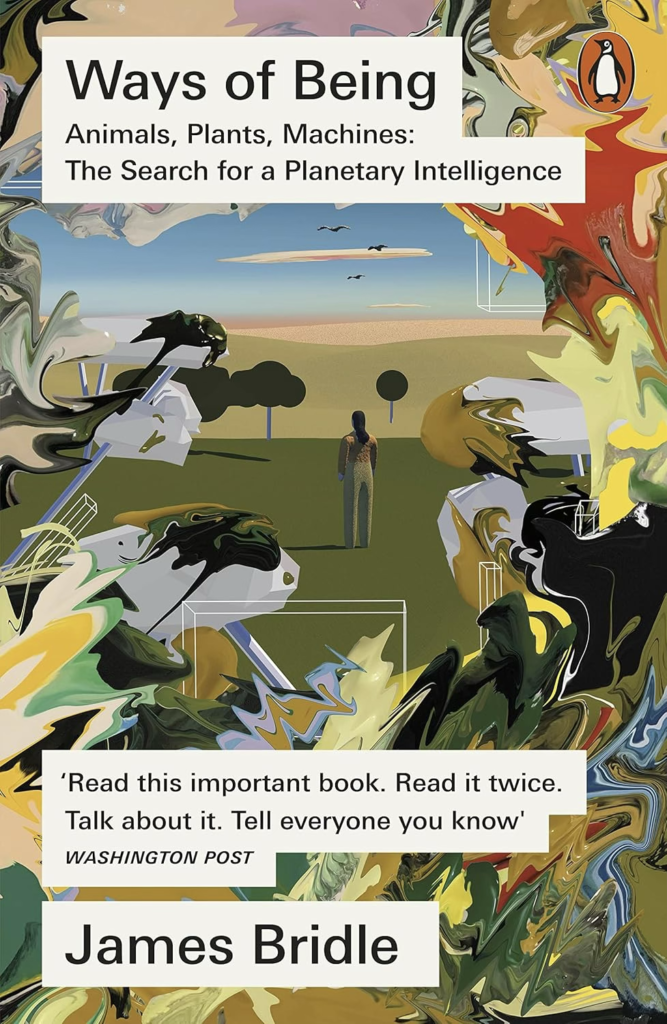
(Source: www.amazon.com.tr)
James Bridle (1980-) is an English author, artist and technologist who studied computer science and cognitive science, and wrote his dissertation on creative applications of AI. Bridle prefers they/them pronouns when referring to self, which makes some sense after reading his 2022 book, Ways of Being. ‘Their’ writings have appeared in media such as the Wired, Domus, the Atlantic, and others, and they have written regularly for the Observer and the Guardian.
The New Aesthetic concept (not to be confused with the New Aesthetics) Bridle coined the term of, refers to the blending of the virtual and the physical in our world, following the increasing presence of the digital technologies. A virgo or libra.
Bridle points out that the development of AI has been led primarily by capitalist companies, and that has led us to think that it can only have that kind of intelligence. However, if we look, we can see the different forms of intelligence exhibited by non-humans whose lives are intricately bound with ours. The human-centered approach has led to domination and destruction, and decentralizing would lead to a more just and regenerative path.
‘There are many ways of doing intelligence because intelligence is an active process, not just a mental capacity’. The testing of animal intelligence (and machines) have been mostly human-oriented, yet criteria for those tests are not even met consistently among humans, either- here, mentioning the theory of mind which is about the ability to think about the inner lives of others, to imagine their mental states and to act accordingly.
Cephalapods are without a centralized brain, and trees and fungi in ‘wood wide webs’ exchange food and information.

(Source: www.onassis.org)
Bridle says,we can begin with looking at our similarities to understand non-humans, and that, studying them in their context/environment is paramount- as opposed to in captivity. And AI is now in a corporate environment, and for it to evolve differently, this ecology needs to be altered.
An example here is from an experiment Monica Gagliano did with mimosa pudica, where she showed the plant’s capability to learn from experience, alter behavior as a result, and recall later. So we realize that a different mechanism has also evolved in some other way to arrive at memory.
Bridle also says that most non-humans are so radically different from us that we need to accept that they are not totally knowable to us. Living with this unknowability means that all we really can and should do is act with solidarity, and trust that we and the world will be able to function in a complex and ever changing landscape where we have no control. Radical otherness is the driver of adaptability.
Natural selection/competition is not the only force in shaping life, but randomness (which is not caused by pressure from the environment) plays at least a just as large role. Biological randomness occurs more frequently in smaller creatures. Larger and more complex forms see a decrease in internal randomness, yet the complexity of their social relations with others increases. Bridle cites examples from ancient and contemporary political practices where random representation led to creative results. The inclusion and equal participation of each and every member of a network is crucial in the functioning of the whole. Encounters mediated by chance produce knowledge, distribute power and elevate all.
‘What we perceive as borders and conflicts [often] turn out not to be artefacts of the exterior world, but immesurable gaps in our own conceptions, abilities and tools of discernment’.
‘The nature of life is not constancy, but change. The driver of change, at the level of the individual and at the level of evolution, is the encounter with the other’. So instead of thinking intelligence as a brain trapped inside a skull, we need to also consider the input from the outside, therefore connection and adaptation are necessary.
Trees and plants are in constant motion- the white spruce can move over 100 km in a decade, but this information is hidden from us unless we study them over time: ‘[Seeing] does not mean knowing or dominating’. Bridle talks about the problems that arise in courts regarding non-humans; saying, we need to recognize their otherness, and shape laws accordingly.
Animal tracking has made it possible to define metapopulations among them, whose mobility, freedom and connectedness ensure better survival. And such tracking over time gives us better perspective on how their intelligence works, not in human terms, but in their own territory with their own particular solutions.
With the example of agromining, Bridle concludes that ‘when we set out to find less destructive ways of finding what we needed in the earth, we discovered that the plants had got there before us’. And one day, together, we might build something even better.
This book has a point to make, so it is understandable that it is emphasizing solidarity and relationships while discrediting individualness: ‘[What] matters resides in relationships rather than things- between us, rather than within us’. Yet I am not convinced that a singular approach is appropriate- individuality along with sociality, inner with outer, alone with together seem closer to our reality as humans- and probably for non-humans as well. Bridle does on one occasion say, ‘[An] organism creates its own umwelt, but also continually reshapes it in its encounter with the world…. Everything is unique and entangled’. However, his emphasis just about everywhere else is on relationships between individuals.
‘There is only nature, in all its eternal flowering, creating microprocessors and datacenters and satellites just as it produced oceans, trees, magpies, oils and us’. As idyllic as this sounds, and I actually agree with it, I am baffled when someone who writes this, turns around and talks about anthropocene- which is about still assuming human is (or at least, capable of being) superior. If that is possible, then there is no possibility of ever being ‘one’. Ignore the evil, and ensure the evil. And my question is unanswered: Does the rabbit consider me? This is not a question with merely selfish expectations- maybe indifference is the better attitude than charity? And how much charity? For ‘solidarity’ could cause overcrowding and such problems. Maybe how rabbit does it could show the way.
It would be easy to pick this book apart for all its contradictions, and visions that largely ignore the evil, and the unconvincing humbleness which is not able to escape talking in words of power. Yet, it is an important book for raising awareness about the ‘beingness’ and intelligence of non-humans, and how to coexist with them.
‘The enemy is not the technology itself, but rather inequality and centralization of power and knowledge, and that the answer to these threats are education, diversity and justice’.
‘[When] we talk about AI, we’re mostly talking about this kind of ‘corporate’ intelligence, and ignoring all the other kinds of things that AI- that any kind of intelligence- could be.’
‘This way of seeing the world [in which man fights and tries to dominate nature] has produced a three tiered classification system for the kinds of animals we encounter: pets, livestock and wild beasts. [In] transferring this analogy to the world of AI, it seems evident that thus far we have mostly created domesticated machines of the first kind, we have begun to corral a feedlot of the second, and we live in fear of unleashing the third.’
‘Perhaps the issue with both AI and the Cybernetic Factory is that we have been trying to entrap a brain within the machine, when the real brain -the oracle- is outside. The oracle is the world. We’ve got everything inside out. We think all the activity as on the inside- when we stick electrodes into the brains of chimps and fruit flies, or strip plants down to their roots and nodules, for example- but the real action is out in the world. That’s where everything arises and intra-acts. Life happens when everything is bouncing off everything else.’
‘In any true relationship based on unknowing- between human, machine, mushroom or cockroach- the participant must forgo any requirement to fully understand the operation of the other. Rather, relationships based on unknowing require a kind of trust, even of solidarity.’
…
Author: James Bridle
Title: Ways of Being: Animals, Plants, Machines: The Search for a Planetary Intelligence
Published: 2023, by Penguin Books
First published: 2022
Pages: 363
